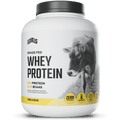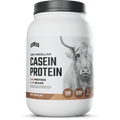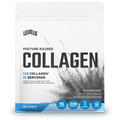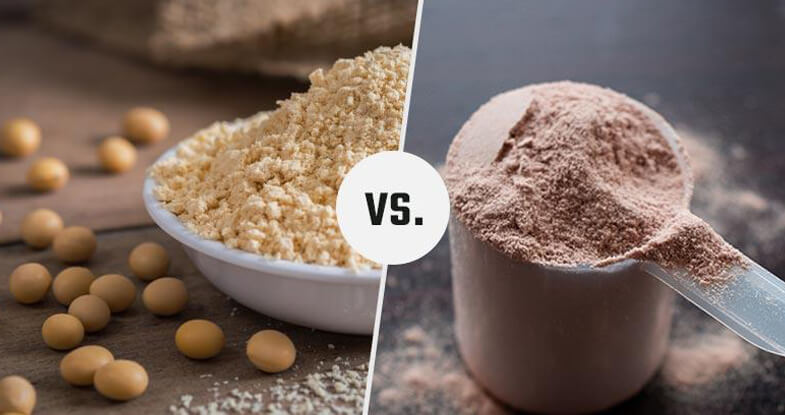This article is about answering one question. Which protein supplement is better — soy protein or whey protein?
The best science suggests that whey protein is superior to soy (and virtually every other protein).
That might sound like an exaggeration, but we’ve got the studies to prove it.
Join us for a thorough look at the differences between soy vs. whey, pros and cons of each, and the scientific properties of each protein source.
What Is Soy Protein and What Is Whey Protein?
Soy protein and whey protein are both popular protein supplements. Soy is vegan, while whey is vegetarian (but also a preferred option for omnivores and carnivores).
People use both of these types of protein powder for meal replacement shakes, post-workout recovery shakes, high-protein recipes, and more.

Manufacturers make soy protein from whole soybeans by first removing the hulls and most of the fat content of the beans. Then they grind and process what remains of the soybeans into either soy flour, soy protein concentrate, or soy protein isolate.
Soy flour is the least refined form, meaning it has less protein and more carbs and fats. Soy protein isolate is the most refined, with the highest protein content (about 26.4 grams of protein per 30-gram serving)[*].
On the other hand, whey protein comes from cow’s milk, often as a byproduct of the cheesemaking process. It’s one of two milk proteins, the other being casein.
And whey protein comes in two forms, whey protein concentrate and whey protein isolate. As the name implies, whey isolate is more refined, with a higher protein content.
However, that doesn’t necessarily make whey isolate superior to whey concentrate. Read Whey Protein Isolate vs. Concentrate: Everything You Need to Know if you want to learn more.
What’s the Difference Between Soy Protein and Whey Protein?
There are two significant differences between soy and whey:
- The amino acid content of whey vs. soy
- The unique proteins and other natural compounds in whey and soy (such as protein fractions in whey and globulins or phytoestrogens in soy)
Let’s first take a look at the amino acid content in the infographic below, beginning with the 9 essential amino acids (EAAs)[*]. Amino acid content is responsible for protein quality, how well protein works for purposes like muscle-building, and more.

As you can see, whey and soy are both complete proteins with all 9 EAAs, but they have very different amino acid contents. We’ll discuss that more in a moment.
And keep in mind that dietary proteins aren’t just a collection of many different individual amino acids. They also contain complex intact proteins made up of amino acids bonded together. These intact proteins have unique effects on your body.
Whey protein consists of several different protein fractions, which are related but distinct proteins. The major protein fractions in whey are called beta-lactoglobulin, alpha-lactalbumin, bovine serum albumin, and immunoglobulins[*].
Along with its unique protein fractions, whey also contains trace amounts of butterfat and lactose (milk sugar).
In contrast, soy protein contains a variety of proteins called globulins[*].
It also contains fiber, enzymes, protease inhibitors (which can inhibit enzymes your body uses to digest protein), and antinutrients called lectins and phytic acid[*].
Finally, soy has bioactive compounds with estrogenic activity, including genistein, daidzein, and glycitein[*]. In other words, these soy compounds mimic the effects of estrogen in your body.
Keep reading to learn what the differences between whey and soy protein supplements mean, practically speaking!
Pros and Cons of Soy Protein
Pros:
- Soy protein is a complete, vegan protein.
- Some people prefer the taste of soy over other plant-based proteins.
- Many people enjoy tofu and other soy products as meat substitutes.
- Active compounds with estrogenic activity (called phytoestrogens) may have health benefits for older women, but the evidence is uncertain[*].
- Protease inhibitors may have anti-cancer or other health properties[*].
Cons:
- Protease inhibitors in soy most likely result in lower protein digestibility[*].
- Lectins and phytic acid can interfere with the absorption of nutrients, including vitamins A and B12, and may cause an upset stomach and other health issues[*].
- Phytoestrogens in soy may lower male testosterone levels and fertility[*][*].
- In pregnant women, soy protein compounds may increase the risk of some birth defects[*].
- Some people are allergic to compounds occurring in soy protein[*].

Pros and Cons of Whey Protein
Pros:
- Whey protein is a complete protein.
- Protein fractions in whey may boost gut health and immune function[*][*].
- Whey protein is the highest-quality protein of all, meaning it has an extremely high amount of essential amino acids and digests rapidly and efficiently[*][*].
Cons:
- A small minority of severely lactose intolerant people experience adverse reactions to whey protein, although most people can tolerate the low amounts of lactose fine[*].
- If you’re vegan, whey protein isn’t an option.
Soy Protein vs. Whey: Which Is Best?
Protein Quality
Protein quality is a score assigned to a protein source based on the quantity of essential amino acids and their digestibility.
The winner is whey protein, hands-down. It’s not only a higher quality protein source than soy, but also the highest quality protein of all proteins[*].
Mixability and Flavor
How do soy and whey protein stack up for mixability and taste?
Soy and whey are tied for mixability. Both are easy to mix in a shaker bottle or blender.
And they both have a nutty taste. Whey tastes fairly mild, while soy protein has a stronger flavor.
The texture of whey protein is smooth and creamy, while soy may be slightly grittier.
However, both protein supplements come in flavored varieties, and it’s ultimately a matter of personal preference.
For Weight Loss
Consuming plenty of protein (around 20-30% of your total calories) can help you burn more calories and fat, lose weight faster, and preserve muscle mass[*][*][*].

But research also suggests that the type of protein you eat matters.
A 2011 study of 90 overweight people compared the effects of soy and whey protein on weight loss[*].
For 23 weeks, the participants consumed two servings (56 grams) of soy, whey, or carbohydrate formula each day as scientists tracked their results. Otherwise, they didn’t change their diet at all.
Whey was the clear winner: the people who received whey ended up with smaller waists, lost 4 pounds of body weight and 5 pounds of fat, and also had lower hunger hormone levels[*]. In contrast, the soy and carb groups didn’t lose weight, burn extra fat, or shrink their waists!
Based on the available evidence, whey supplements are the winner over soy protein for weight loss.
For Workout Recovery and Soreness
Studies support the use of soy as well as whey to enhance recovery and reduce soreness after training[*][*].
There’s no clear winner in scientific research, making it a tie.
For Building Muscle
Without question, soy and whey both enhance muscle-building in people who lift weights[*].

And despite the higher protein quality rating of whey, a 2018 meta-analysis (a study that reviews all existing studies) found that while whey increases muscle growth more initially, the results of soy versus whey are comparable from 6 weeks onward[*].
Perhaps future research will show a clearer advantage to whey, but that’s what current evidence says.
Regardless, the higher protein quality and the evidence of greater short-term muscle-building give whey protein a slight edge over soy, making it the winner for hypertrophy.
For Digestion and Absorption
One significant issue with soy protein is that it contains protease inhibitors that can reduce protein digestibility[*][*].
Aside from that, whey protein drinks also digest more quickly than soy, which makes them an excellent choice for post-workout shakes[*].
Whey is the definite overall winner for both digestion and absorption.
Check out Protein Absorption: Everything You Need to Know to learn more about the ins and outs of digesting protein.

Side Effects of Soy Versus Whey
First off, soy and whey are essentially tied when it comes to the risk of allergies.
More people are affected by lactose intolerance (around 75% of adults worldwide) than soy allergy (0.5% or less of the general population)[*][*].
However, as we mentioned earlier, whey protein powder generally doesn’t contain enough lactose to trigger most people’s lactose intolerance.
But assuming you aren’t allergic to either type of protein, what about the other side effects?
Whey has almost no side effects, but studies link soy consumption to poor nutrient absorption, reproductive health issues, fertility problems, and birth defects[*][*][*][*].
Soy Protein vs. Other Vegan Protein Powder
If you aren’t vegan, the choice between whey and soy is obvious. Whey wins in nearly every category and ties in 2-3. Soy wins over whey in zero categories.
But if you don’t consume animal products, should you drink soy protein shakes anyway?
Probably not, or at least not as your primary protein supplement.
The good news is that some plant-based proteins like pea protein are complete protein sources without the undesirable effects of soy protein supplements.
Admittedly, they don’t offer the quality of whey protein, and they may have other downsides (like mixability and taste), but at least you’ve got healthy options as a vegan.
The Bottom Line: Is Whey Protein Better Than Soy Protein?
The takeaway boils down to a single, simple question: is whey protein better than soy protein?
Yes. It’s that simple.
Even if you’re vegan or can’t drink whey for some other reason, soy still isn’t the best plant protein option.
Sure, there’s nothing wrong with enjoying some tofu, tempeh, or other soy products from time to time.
But no matter who you are, soy protein supplements are nowhere near the best choice for regular use.















